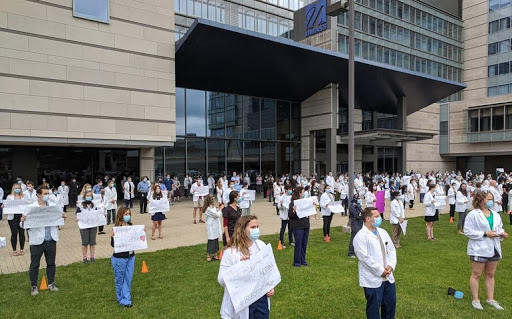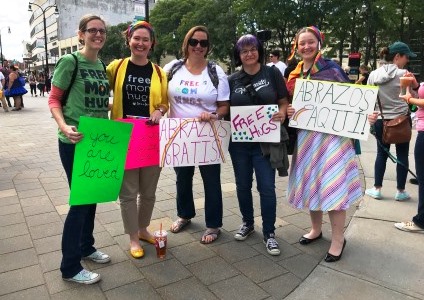Social Equity and Inclusion at the Worcester Family Medicine Residency
Historical and structural forms of social oppression based on identity, including racism, sexism, homophobia, transphobia, xenophobia, classism, ableism, and discrimination based on religion or education, have a profound effect on the health of individuals and communities. Despite our commitment to do no harm, medicine has often perpetuated and benefited from social inequities, exploiting vulnerable populations and patients on numerous occasions. While this is a longstanding historical pattern, the inequities persist to this day and are in some instances expanding.
 UMass residents, students, faculty, nurses, social workers, police, administrators, and more gather for a socially-distanced Black Lives Matter protest on our University Campus.
UMass residents, students, faculty, nurses, social workers, police, administrators, and more gather for a socially-distanced Black Lives Matter protest on our University Campus.
The Worcester Family Medicine Residency (WFMR) is working to address structural oppression within our own program, within medicine, and within our society. We believe this is not just an extension of our mission to promote health and wellbeing in our communities, but an essential component of that work. We have established two standing task forces with resident and faculty members to further this work: the Structural Oppression and Anti-Racism Committee (SOAR) and Diversity in Recruitment Committee. In addition to this work at the central residency level, each of our health centers is working on these issues in multiple ways.
The patient population served at our Family Health Center of Worcester (FHCW/Queen St.) site is highly diverse and medically underserved; 53% of our patients are Latinx, 18% are Black, 9% are API, and 21% are multiracial. We provide services in 55 languages for the 46% of our patients best served in a language other than English. Three-quarters of our patients are living under the federal poverty level and 94% live under 200% FPL. Our residents participate in a two-year Vulnerable Populations Workshop curriculum. We also provide residents with opportunities to address inequality in their clinical work through our HIV and viral hepatitis program, refugee and asylum clinic, Homeless Outreach and Advocacy Program, gender affirmation clinic, Office Based Addiction Treatment program, direct transfer of care of patients following incarceration, and more.  Recent Global Health Fellow Raulo Colón-Mulero and recent WFMR grads Judy Wang and Becca Gwaltney alongside family medicine resident colleagues from ELWA Hospital in Liberia.
Recent Global Health Fellow Raulo Colón-Mulero and recent WFMR grads Judy Wang and Becca Gwaltney alongside family medicine resident colleagues from ELWA Hospital in Liberia.
Our Hahnemann Family Health Center residents are involved in reproductive justice work and receive training in medical and surgical abortions. The site is also committed to practice transformation and quality improvement with a lens on health equity and access. Residents interface with medical students, fellows, and residents from other specialties in the clinical setting and are working to reinvigorate health center-based didactics to focus on social justice.
At Barre Family Health Center, residents work with an underserved rural community. They provide compassionate care for patients living with chronic pain and substance use disorders. A nearby behavioral facility affords the opportunity to care for a number of trans teens, including by providing puberty blockade in the primary care setting. They also offer medical abortions and plans are underway to launch an asylum clinic.
These efforts are ongoing and we as individuals and as a residency program are committed to doing the daily work to mitigate harm and build a better system. This is going to be a long and difficult road to acknowledge the painful history and persistent inequalities facing our communities. We acknowledge that we have not and may never arrive at our destination. We believe we have a responsibility as physicians to combat discrimination, prejudice, and structural inequality, as well as to celebrate the diversity of human experience. Our PD, Ginny Van Duyne, MD (L) at the Worcester Pride Parade.
Our PD, Ginny Van Duyne, MD (L) at the Worcester Pride Parade.